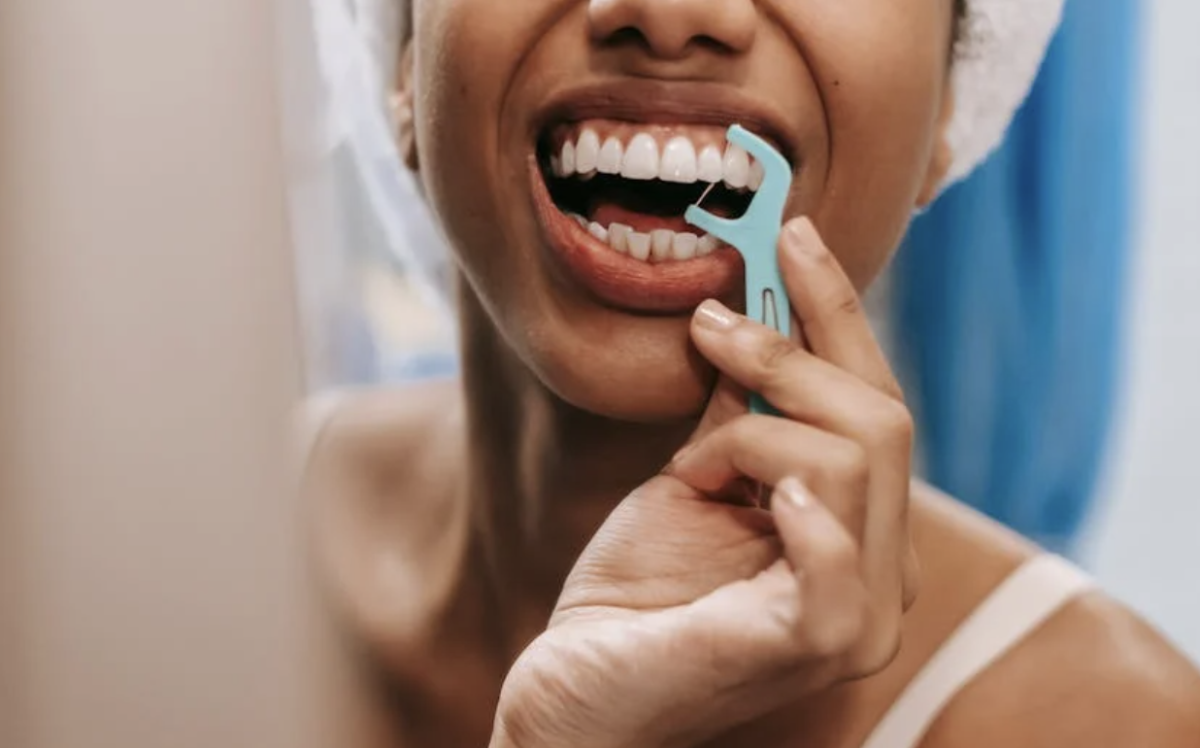
Every morning and night, you dutifully brush your teeth and grab that little container of floss. But if you're doing these two essential tasks in the wrong order, you might not be getting the full health benefits that become increasingly crucial as we age. Surprisingly, the sequence matters more than you might think—especially when you consider that 280 million adults over 70 are affected by oral disorders worldwide.
The stakes are higher for seniors when it comes to oral health.
Gum disease affects 70% of seniors aged 65+, and 25% of US adults over 60 have lost all their teeth.
What's more concerning is that poor oral health isn't just about your mouth anymore—it's connected to your heart, brain, and overall quality of life.
Why your medication cabinet changes the oral health game
Here's something your dentist might not have mentioned during your last cleaning: about 400 commonly used medications cause dry mouth.
If you're taking medications for blood pressure, heart conditions, depression, or allergies—all common among seniors—your mouth is producing less saliva than it used to.
Saliva isn't just spit; it's your mouth's natural defense system. It washes away food particles, neutralizes acids, and helps prevent tooth decay.
When medications reduce saliva production, every brushing and flossing session becomes more important, and the order in which you do them can make a real difference in how clean your mouth gets.
"Flossing first removes food particles and plaque from between the teeth—areas that a toothbrush simply can't reach"
Also read: Dental care can be costly, but these 5 tricks could save you money
The science is clear: floss first, brush second
Dentists have been studying this question, and the answer might surprise you.
Even though it seems logical to clean your teeth first and then floss away any remaining debris, research shows the opposite approach is more effective.
When you floss first, you're loosening and dislodging plaque and food particles from those tight spaces between your teeth that your toothbrush can't reach.
Then, when you brush afterward, you're able to sweep away all that debris while also allowing the fluoride in your toothpaste to reach more tooth surfaces.
Think of it like cleaning your house—you dust first, then vacuum up what falls to the floor.
The same principle applies to your teeth.
This becomes even more critical as we age because more than half of seniors have moderate or severe periodontal disease, making thorough cleaning essential.
Also read: A surprising new ingredient could change the future of dental care
When arthritis makes flossing a challenge
Let's be honest—traditional string floss can be tough to handle when your fingers aren't as nimble as they used to be.
Arthritis, reduced dexterity, or simply the awkward angle required for back teeth can make daily flossing feel like a chore you'd rather skip.
But skipping isn't an option when you understand the bigger health picture.
The good news is that you have alternatives that can make the floss-first approach manageable:
- Floss picks or holders: These give you better grip and control
- Water flossers: Use water pressure to clean between teeth—easier on joints
- Soft-pick interdental cleaners: Rubber tips that slide between teeth more gently
- Floss threaders: Helpful if you have bridges or permanent retainers
Senior-friendly flossing tools that work
Water flossers (like Waterpik) are particularly effective for seniors with limited mobility. They use pulsating water to remove plaque and are gentler on sensitive gums. While they cost more upfront ($30–100), they often pay for themselves by reducing dental problems that lead to expensive treatments.
Also read: The truth about toothpaste, timing, and tools—dentists break it down
The heart-health connection you can't ignore
Here's where the stakes get really high—your mouth health is directly connected to your heart health, diabetes control, and even cognitive function.
There is increasing evidence of the association of periodontal disease with chronic conditions including diabetes, heart disease, and stroke.
When bacteria from gum disease enter your bloodstream, they can contribute to inflammation throughout your body.
For seniors who may already be managing conditions like diabetes or heart disease, maintaining excellent oral hygiene isn't just about keeping your teeth—it's about protecting your overall health and independence.
This connection explains why the floss-first technique matters more as we age.
Every bit of extra plaque and bacteria you can remove makes a difference in your systemic health.
Also read: What your tooth color may reveal about your health
The Medicare reality: prevention is your best insurance
Here's a frustrating reality—traditional Medicare does not cover routine dental care, and approximately 70% of older Americans lack dental insurance.
Even more concerning, more than one in five Medicare beneficiaries have not visited a dentist in five years.
This makes your daily home care routine absolutely critical.
When professional dental care is expensive or hard to access, preventing problems becomes your most important investment.
The floss-first technique costs you nothing extra but can help prevent the expensive dental procedures that Medicare won't cover.
Also read: Think you're brushing right? Here’s the surprising reason you should never rinse after brushing
Making it a habit that sticks
The best time to floss is whatever time you'll actually do it consistently.
For many seniors, nighttime works best—you're winding down, have more time, and you're already in your bathroom routine.
Start with just committing to the new sequence: floss first, then brush.
Don't worry about perfect technique initially.
As one dentist notes, the most important thing is consistency—the best flossing tool is the one you'll actually use regularly.
Did you know?
Did you know?
Your saliva production naturally decreases with age, even without medications. This means the plaque-fighting power you had in your younger years isn't there anymore. The floss-first technique becomes even more important because you need every advantage in keeping bacteria levels low.
Also read: Could dentists one day help you regrow your own teeth?
Beyond the basics: what else can help
Consider adding an antiseptic mouthwash to your routine after brushing. Research shows that antiseptic mouthwash can be significantly more effective than flossing alone at reducing harmful bacteria.
When you combine proper flossing technique with brushing and mouthwash, you're creating a powerful defense system for your oral and overall health.
If you wear dentures, the same principle applies to your cleaning routine. Remove food particles and plaque first, then clean thoroughly with your denture cleaner.
Your new routine for better oral health
- Floss first to loosen debris and bacteria
- Brush second to remove what you've loosened and get fluoride to more surfaces
- Consider a water flosser if traditional floss is difficult to handle
- Add antiseptic mouthwash for extra bacteria-fighting power
- Remember: this routine matters more as medications and age affect your saliva production
Also read: Ditch the sugar? See which unexpected foods could be harming your teeth
The bottom line: small change, big impact
Switching to floss-first might feel awkward for the first week or two, but the health benefits compound over time.
When you consider that oral health problems can contribute to heart disease, diabetes complications, and cognitive decline—all major concerns for seniors—this simple sequence change becomes a powerful health habit.
Your teeth and gums have supported you for decades.
Now it's time to support them with the most effective cleaning routine possible.
The floss-first technique gives you the best chance of keeping your natural teeth healthy and your body's inflammation levels low.
Remember, you're not just taking care of your teeth—you're taking care of your heart, your brain, and your independence.
Every night when you reach for that floss first, you're making an investment in staying healthy and active for years to come.
Read next:
- Is your insurance working against you? A dentist’s bold move is exposing a growing issue
- Is nighttime teeth grinding secretly harming you? Here’s how to tell—and what to do about it
- Think your morning routine is healthy? One mistake could be ruining your teeth
What's your biggest challenge with your current dental routine? Have you tried water flossers or other tools to make flossing easier?
Share your experiences and tips in the comments below—your insights could help a fellow reader find the solution that works for them.
Primary Source
https://www.goodhousekeeping.com/he...u-floss-your-teeth-before-or-after-you-brush/
60+ Oral Health Statistics in 2024 | Shortlister
Cited text: 280 million adults over 70 are affected by oral disorders.
Excerpt: 280 million adults over 70 are affected by oral disorders
https://www.myshortlister.com/insights/oral-health-statistics
28+ Oral Health Statistics and Facts 2025 | Humble Memorial Dental Group
Cited text: Gum disease affects 47% of adults aged 30+, and 70% of seniors aged 65+.
Excerpt: Gum disease affects 70% of seniors aged 65+
https://humblememorialdental.com/dental-tips/oral-health-statistics/
28+ Oral Health Statistics and Facts 2025 | Humble Memorial Dental Group
Cited text: · 25% of U.S. adults over 60 have lost all their teeth.
Excerpt: 25% of US adults over 60 have lost all their teeth
https://humblememorialdental.com/dental-tips/oral-health-statistics/
60+ Oral Health Statistics in 2024 | Shortlister
Cited text: Public Health, 2021) 25% of US adults older than 60 don’t have natural teeth.
Excerpt: 25% of US adults over 60 have lost all their teeth
https://www.myshortlister.com/insights/oral-health-statistics
28+ Oral Health Statistics and Facts 2025 | Humble Memorial Dental Group
Cited text: 400+ commonly used medications cause dry mouth, increasing the risk of cavities.
Excerpt: about 400 commonly used medications cause dry mouth
https://humblememorialdental.com/dental-tips/oral-health-statistics/
60+ Oral Health Statistics in 2024 | Shortlister
Cited text: (Dental Health, 2022) 400 commonly used medications cause a dry mouth and increase oral disease risk.
Excerpt: about 400 commonly used medications cause dry mouth
https://www.myshortlister.com/insights/oral-health-statistics
Oral Health and Aging - PMC
Cited text: About 400 commonly used medications can cause dry mouth, which heightens the risk of oral disease.3 · About one half of seniors do not go to the denti...
Excerpt: about 400 commonly used medications cause dry mouth
https://www.ncbi.nlm.nih.gov/pmc/articles/PMC5497890/
Oral Health and Aging - PMC
Cited text: More than half (53%) of seniors have moderate or severe periodontal disease.
Excerpt: more than half (53%) of seniors have moderate or severe periodontal disease
https://www.ncbi.nlm.nih.gov/pmc/articles/PMC5497890/
Oral Health and Aging - PMC
Cited text: There is increasing evidence of the association of periodontal disease with chronic conditions including diabetes, heart disease, and stroke.
Excerpt: There is increasing evidence of the association of periodontal disease with chronic conditions including diabetes, heart disease, and stroke
https://www.ncbi.nlm.nih.gov/pmc/articles/PMC5497890/
Oral Health and Aging - PMC
Cited text: There is increasing evidence of the association of periodontal disease with chronic conditions including diabetes, heart disease, and stroke.
Excerpt: There is increasing evidence of the association of periodontal disease with chronic conditions including diabetes, heart disease, and stroke
https://www.ncbi.nlm.nih.gov/pmc/articles/PMC5497890/
Oral Health and Aging - PMC
Cited text: For its 55 million beneficiaries, traditional Medicare does not cover routine dental care.
Excerpt: traditional Medicare does not cover routine dental care
https://www.ncbi.nlm.nih.gov/pmc/articles/PMC5497890/
Oral Health and Aging - PMC
Cited text: Approximately 70% of older Americans lack dental insurance.
Excerpt: approximately 70% of older Americans lack dental insurance
https://www.ncbi.nlm.nih.gov/pmc/articles/PMC5497890/






